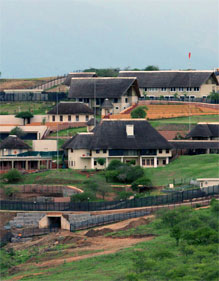
Public Works (DPW) is responsible for managing the accommodation needs of government entities. It promotes the national Expanded Public Works Programme, which contributes towards the transformation of the local construction and property sectors.
It’s also the department most deeply involved in the Nkandla upgrade scandal.
Nxesi has been vocal about tackling corruption within the department, earning him Corruption Watch hero status in August 2012. Since then it’s been downhill for DPW – in January 2013 and July 2014 it was voted a zero for its mismanagement of public funds.
‘Cleaning up corruption in the DPW has to be one of the most difficult jobs in government,” said Corruption Watch’s executive director David Lewis. “As Nxesi’s and the department’s unique place as both a CW hero and zero establishes, we believe that he has tackled this with a varying degree of success. This latest report seems to indicate that ground is being made.”
The full extent of the DPW mismanagement was only revealed last week, as Nxesi declared optimistically that the department’s turnaround strategy, part of which involves the rooting out of corruption, fraud and bad management practices, was bearing fruit.
“The briefing this morning will show how the department is winning the war against maladministration, poor performance and issues of fraud and corruption,” he said. “This is demonstrated by our resolve to deal with the historical burden of irregular expenditure.”
The numbers he quoted were mind-boggling – during the 2009/2010 financial year and before, the department misspent 65% of the total irregular expenditure, or R22.6-billion, with an average of R3.9-billion per year in the following three financial periods. However, Nxesi did show that it was steadily dropping – in the 2013/2014 financial year a relatively paltry half a million, or 2%, was wasted.
The information was gleaned from an in-depth review of around 1.3-million transactions. It’s possible, said Nxesi, that some of the irregular expenditure was related to “suspicious practices”.
“My team has already identified transactions to the value of approximately R1.1-billion that have been referred to the Special Investigating Unit (SIU) as well as the department’s Fraud Awareness and Investigations Unit. This amount forms part of the R35-billion.”
As for accountability, this will be determined after a full investigation into each instance of irregular expenditure. Officials found guilty will have to suffer the consequences, Nxesi warned.
“I can also give you the assurance that appropriate action will be taken against perpetrators where there are found to be reasonable grounds for it.”
In the past five years, he added, more than 100 cases of fraud and corruption involving more than R1.1-billion have been finalised or are under investigation, and a number of DPW officials are facing criminal charges – the minister mentioned some of these by name.
Adopted in 2012, the turnaround strategy has also seen the revitalisation of the Property Management Trading Entity, which exists to “professionally and optimally” manage the government property portfolio. Nxesi has mentioned that he would like professionals from the private sector to fill senior roles in the new-look unit.
Runaway wastage of public money
An SIU report, submitted to Parliament in September, revealed that senior DPW officials failed in their responsibilities to oversee spending at the Nkandla homestead of President Jacob Zuma – instead, they allowed consultants to dictate terms.
This is the reason, according to the SIU, that costs ballooned from an initial estimate of R27-million to the final tally of R246-million. At least one of the 15 DPW officials fingered, Nkandla project manager Jean Rindel, has claimed that he will only accept responsibility for his part in the debacle and will not be the fall guy for anyone else.
In March, public protector Thuli Madonsela released her own Nkandla report, titled Secure in Comfort. It found that numerous items added to the president’s homestead, which had been built as security measures, were in fact not security measures at all under the legal framework, and added substantial value to the Nkandla property at no cost to Zuma.
“Whatever Nxesi achieves in his department, he will always be known as the minister who attempted to cover up the Nkandla scandal and who attempted to scapegoat officials in his own department in order to deflect blame from where it really belongs: with the president and his cronies,” said Lewis.

